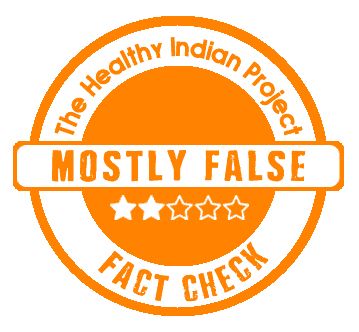Last Updated on April 9, 2024 by Neelam Singh
Quick Take
A popular social media post claims to see a solar eclipse with bare eyes. After verifying the assertion, we discovered that the claim was mostly false.

The Claim
A highly circulated post on the X platform claims that one can witness the solar eclipse with the unprotected eye, highlighting the fact that this is the traditional method of observing such events.
Our vision of the sun is obscured by the moon during a solar eclipse. The course of this process takes several hours. Only during the New Moon phase, which occurs during the day, does this phenomenon occur. There may be a partial or total solar eclipse.
While witnessing a solar eclipse is an unforgettable experience, one should take safety precautions to avoid catastrophic eye damage. Hence, such irresponsible social media assertions can be dangerous.
We have been actively sharing evidence-based information about eye cancer. These mostly address the disease’s aetiology, diagnosis, and treatment plan, in addition to the mortality rates associated with it.
Fact Check
Is it credible for the claimant to make claims about solar eclipses?
No, not really. We used the video’s keyframe to perform a Google Reverse Image search, which led us to the thee_epiphanie account page. Regrettably, no eye specialist, space scientist, or other person with a solid scientific background who could make such claims authoritatively owned the page. Such an individual wouldn’t understand the risks of solar retinopathy, a potentially fatal condition that can happen if someone watches a solar eclipse without wearing eye protection. Therefore, it would be unwise and risky to heed the claimant’s advice.


Dr. Nikita Chauhan, an obstetrician and gynaecologist, advises against relying only on someone or an organisation’s medical information unless you have confirmed their qualifications. Dr. Nikita further explains that people are usually not the best sources of information if their credentials aren’t very clear.
Is it safe to witness a solar eclipse with bare eyes?
No, it is not safe to see a solar eclipse with your unprotected eyes.
According to the American Academy of Ophthalmology, even a short while in the sun without the appropriate eye protection might harm your retina irreversibly. In extreme cases, exposure to these solar flares may result in solar retinopathy or blindness.
Solar or photic retinopathy is characterised by retinal damage. This could be brought on by prolonged exposure to strong light sources. This intense light is visible when arc welding, during solar eclipses, or even when one is simply staring directly at the sun.
The retina, which is sensitive to light and is usually found in the rear of the eye, is responsible for converting light into neural signals. These signals are received by the brain, allowing us to perceive images. As a result, extended exposure to light might eventually harm the retina’s photoreceptor cells by overwhelming them. This phenomenon may be especially noticeable in the macula, the area of the retina in the centre that is responsible for crisp central vision. In addition, solar retinopathy has the potential to generate acute foveal damage, hence giving rise to abnormalities in the outer retina.
The sun’s radiation damages the retina’s sensitive cells, resulting in blurred vision, blind spots, altered coloured vision, and difficulty in discerning fine details. Most of the time, the issue resolves itself, but prolonged exposure to intense light may result in irreversible vision loss. Consequently, it is advised to see an ophthalmologist for early identification.

When we asked Dr. Aditya Sethi, Ophthalmologist at Arunodaya Deseret Eye Hospital, Gurgaon whether a solar eclipse could be gazed at with bare eyes, Sir said, “As an ophthalmologist, my primary concern during a solar eclipse is ensuring the public’s eye health and safety. It’s crucial to recognise that looking directly at the sun, even during an eclipse, can lead to permanent eye damage or blindness. Therefore, one of the absolute ‘dos’ is to use ISO-certified eclipse glasses or handheld solar viewers that meet the ISO 12312-2 international standard for safe viewing. Looking at the sun with regular sunglasses—even the very dark ones—is not safe. Another important ‘do’ is to use indirect viewing methods, such as a pinhole projector, to observe the eclipse safely.
On the ‘don’ts’ side, never look at the sun through an unfiltered camera, telescope, binoculars, or any other optical device, as concentrated solar rays can damage the filter and enter your eye, causing serious injury. Also, don’t use homemade filters or wear eclipse glasses with scratches or damage, as their protective capabilities might be compromised. Ensuring your viewing equipment is in perfect condition and adhering to safety guidelines can make a solar eclipse a memorable and safe experience for everyone involved.”

On asking Dr. Vaibhav Sethi (MBBS, DNB, FICO), Vitreoretinal specialist at Arunodaya Deseret Eye Hospital in Gurgaon, advised that, “It is not safe to observe a solar eclipse with bare eyes; doing so can cause serious damage to your eyesight. It’s essential to use proper eye protection, such as solar viewing glasses or specially designed solar filters for telescopes or binoculars that block harmful ultraviolet radiation.”
Moreover, it is important to emphasise how important it is to prevent solar retinopathy. Wearing the proper eye protection and adhering to safety protocols are essential for protecting oneself from UV and infrared radiation.
How can the sun be safely observed during a solar eclipse?
Please be advised that, to safely observe the sun during an eclipse, solar filters are advised. According to the American Astronomical Society, using filters—like those found in eclipse glasses or handheld solar viewers that adhere to ISO 12312-2—is the only safe way to view the sun directly during an eclipse in a safe manner.
Even solar glasses necessitate caution:
It is suggested that while facing the sun, one must stay still, and shield their eyes to witness a solar eclipse.
Before being used, solar filters should be thoroughly inspected for any damage or scratches. It is critical to follow the directions, especially when assisting children in making appropriate use of these devices. However, protective solar eyewear might not always guarantee your eye’s safety.
The use of solar filters is not always necessary. A total eclipse occurs when the moon completely covers the sun’s bright face. At that point, one may remove their safety glasses, but they must use their solar viewer again to observe the remaining partial phase as soon as the sun begins to shine again.
Most importantly, avoid using binoculars, telescopes, unfiltered cameras, or other similar instruments to see the uneclipsed or partly sun. When considering the use of a particular solar filter with optical devices, such as cameras or telescopes, one should speak with an expert in astronomy.
Disclaimer: Medical Science is an ever evolving field. We strive to keep this page updated. In case you notice any discrepancy in the content, please inform us at [email protected]. You can futher read our Correction Policy here. Never disregard professional medical advice or delay seeking medical treatment because of something you have read on or accessed through this website or it's social media channels. Read our Full Disclaimer Here for further information.

